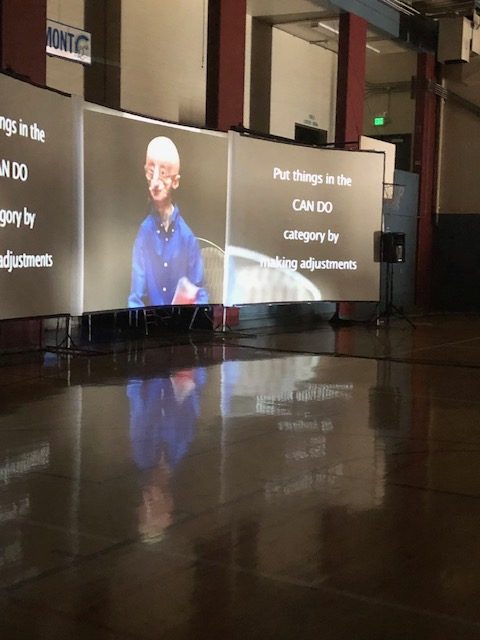By Mary O’KEEFE
In recognition of Red Ribbon Week, Rosemont Middle School held an assembly that concentrated less on the traditional “don’t do drugs” message and more on how anything is possible, that dreams can be obtained, despite age or other issues that may, for some, appear to be obstacles.
A program sponsored by Rosemont PTA called “3 Screens” was brought to the school by Robert Burns and focused on kids putting their ideas into the “Can Do” category instead of feeling overwhelmed and hopeless.
“There are different stories [presented] that focus on making good choices and doing your best,” Burns said.
He has been taking this, and similar programs, around to schools for 26 years. He travels as far as Utah and Arizona with “3 Screens.” The program is part of the company Academic Entertainment that provides educational programing for schools. The assembly at Rosemont was not only a visual presentation but was also sprinkled with music by artists kids recognize.
Three large movie screens were placed side-by-side at one end of the school gym. The stories were not told in a lecture style but by using examples that exemplified perseverance, empathy for others and dealing with consequences.
One story was narrated by an 18-year-old girl who was filming on her cellphone while her friend was driving drunk. She and her friends had been at a club drinking before they all got into the car. Although they were underage, she said, it was easy for them to get alcohol.
They got into a fatal accident. There were three teens in the car that night. Not only was the 18-year-old filming the driver from the backseat of the car but she was also encouraging her friend to drive faster. Then the driver lost control and the car flipped over, slamming into a wall.
The Rosemont students heard the 18-year-old’s frantic 911 call. In the end the 18-year-old was the only survivor. The girl now takes every chance she can to talk to young audiences about that night. She said she would do anything to change what happened, but she can’t; she can only live with what happened and the role she played in the accident that killed her friends.
The consequences of drinking and driving were not lost on the kids as they quietly listened to her story.
“I thought there were a lot of stories that [either] made you feel happy or, like the drunk driving story, made you feel sad,” said seventh grader Kate Seals of the 3 Screens presentation.
Molly Yhan, a seventh grader, agreed.
“I thought a lot of stories were touching but I was shocked about the drunk driving one,” Yhan said. “She was the one who survived and has to live with it all of her life.”
Diana Burcea, another seventh grader, also liked the program and thought some of the stories were inspirational, including one of a child with a disability.
“I think the one where [the boy] had a disability, where he’d say, ‘I don’t want you to feel bad for me,’” she said of one story that was particularly impactful to her.
There was a 17-year-old boy, Sam Berns, who had Progeria, a syndrome that is characterized by the appearance of accelerated aging. The young man spoke of wanting to play the snare drums in his school’s marching band. The harness, however, weighed too much for him to carry so an engineer helped redesign the harness. He was able to then play in the band. The film shared part of a Ted Talk Berns had done.
“My philosophy [for a happy life] has three parts, essentially,” Berns said.
He then quoted the movie “Ferris Bueller”: “Life moves pretty fast. If you don’t stop and look around once in a while, you could miss it.”
He continued sharing his philosophy, which included: 1. Be okay with what you ultimately can’t do, because there is so much you can do. 2. Surround yourself with people you want to be around. 3. Keep moving forward. He quoted Walt Disney, “Around here … we don’t look backwards for very long. We keep moving forward, opening up new doors and doing new things.”
The assembly continued to focus on those who looked for solutions instead of focusing on problems. One example was of a private school basketball team that annually played a juvenile hall team. Two private school students realized the other team did not have an audience cheering for them so they decided to “share” their fans in the stands. There was the story of an actor with cerebral palsy who spoke about being bullied and another of kids who did not let stereotypes affect their ability to succeed.
Burcea, Yhan and Seals all felt the approach of the assembly worked.
“If you just say, ‘Don’t do drugs’ no one will listen,” Seals said.
It was hearing about the consequences and giving kids a positive alternative to drugs that seemed to make a difference to the audience.

